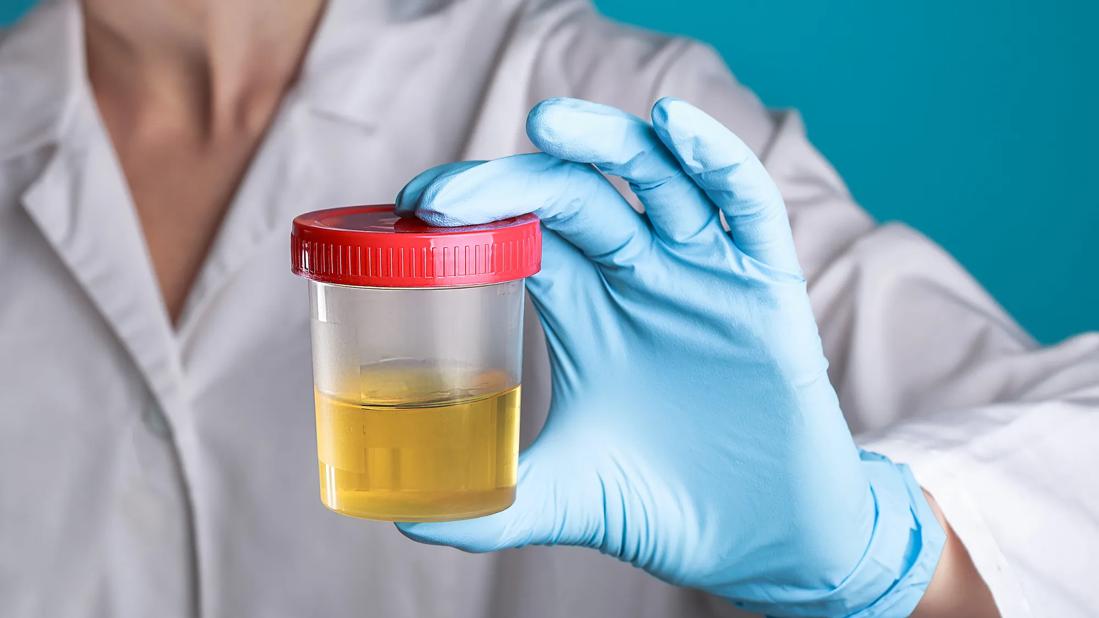Urine can contain bacteria, viruses and more — don’t drink it or use it to clean wounds

Image content: This image is available to view online.
View image online (https://assets.clevelandclinic.org/transform/5fea0072-13bb-46c5-81f8-a5f36dee3e3d/urine-sample-1291803607)
Healthcare provider holding urine sample with gloved hands
People of a certain age may have heard that urine is sterile, as seen in the movies Fight Club and Dodgeball. But as urologist Neel Parekh, MD, explains, that’s a myth. Dr. Parekh offers a reality check — and shares some crucial reminders about personal hygiene.
Advertisement
Cleveland Clinic is a non-profit academic medical center. Advertising on our site helps support our mission. We do not endorse non-Cleveland Clinic products or services. Policy
The myth that a healthy person’s urine is sterile isn’t just a pop culture creation: It’s something medical professionals believed for a long time.
“Old lab testing techniques weren’t sensitive enough to pick up small amounts of bacteria,” Dr. Parekh shares. “As the technology improved and we developed more advanced ways to test for bacteria, we learned that there actually are microbes and other contaminants in the urine. The levels are typically harmless for most people, but they’re still there.”
While healthy urine always has trace quantities of bacteria and other germs, it picks up more as it travels through your urinary tract and out of your body.
And if you aren’t healthy? Well, your pee might reflect that, too. More on how in a bit.
According to Dr. Parekh, urine is usually about 95% water. That other 5% includes:
Depending on your overall health, your pee may contain other substances, too. If you’re living with chronic kidney disease (CKD), for example, your urine may contain protein. If you have a urinary tract infection (UTI) or a staph infection, you’ll have more bacteria in your urine. There are even some viruses that show up in pee, like COVID-19 and herpes simplex.
Advertisement
Even if urine was sterile (which it isn’t), Dr. Parekh says you’d still need to wash your hands after using the toilet. After all, the bathroom isn’t sterile either.
“There are microbes on your hands, your genitals — the entire surface of your skin,” he continues. “You can also pick up germs from surfaces like the toilet seat, the flush handle, the doorknob and more. You have to wash your hands to prevent spreading those bacteria around your body, to other people and your food.”
While it’s rare, coming in contact with someone else’s urine does have the potential to make you sick. It’s also possible — but uncommon — to get sick after being exposed to your own pee. For that to happen, your pee would probably need to enter either (1) an open wound or (2) one of your external mucus membranes, meaning your:
If you’re exposed to urine often — like maybe you have a baby at home or you work in a caregiving field — try to avoid direct contact and make use of any personal protective equipment (PPE) you have. If pee gets on you, wash the affected area with soap and water.
Now that we’ve clarified that urine isn’t sterile, let’s clear up some related rumors: It is never a good idea to drink your pee — or use it to treat an injury or illness.
“There are all of these survival stories where people pee on wounds to speed healing — or drink their urine to combat dehydration,” Dr. Parekh laments. “But these kinds of stories have been debunked.”
Urine does not have antiseptic properties. In fact, it could make an injury or illness worse.
“Peeing on your wound can introduce new bacteria and slow or reverse the healing process,” he adds. “And peeing on an injury caused by venom — like a snake or spider bite — can actually activate venom release.” (The same is true of jellyfish stings, by the way.)
What about drinking your pee? In a dire situation, wouldn’t it help?
“Drinking urine can actually increase dehydration because of its salt and waste content,” Dr. Parekh explains. “Consuming it can only make things worse.”
Urine isn’t sterile, antiseptic or the cure for what ails you — but it’s also nothing to fret over. Everybody pees. And everybody’s pee is mostly water. Contact a healthcare provider if you notice changes in:
Otherwise, rest assured: There’s no need to cry over a little spilled pee.
Advertisement

Sign up for our Health Essentials emails for expert guidance on nutrition, fitness, sleep, skin care and more.
Learn more about our editorial process.
Advertisement
Don’t ‘go with the flow’ if you have issues with urge incontinence or a contagious infection
Going seven times a day is average, but more or less can be OK, too, as long as you’re not experiencing drastic changes
Pee is usually odorless, but if it’s stinky, your diet is the most likely culprit
An enlarged prostate, diuretics and bladder irritants can all contribute
Try elevating your legs during the day and stop drinking two hours before bed
Find out whether you should head to the bathroom after the bedroom
It’s completely normal for the color of your urine to vary a little day by day, but it should stay within a certain range of yellow
Why this strange symptom might spell double trouble
Although it could be used as a moisturizer, this new trend is not recommended
Communicating clear limits helps protect your time, energy and emotional well-being
High cholesterol can be genetic, but testing and treatment can lower your heart disease risk